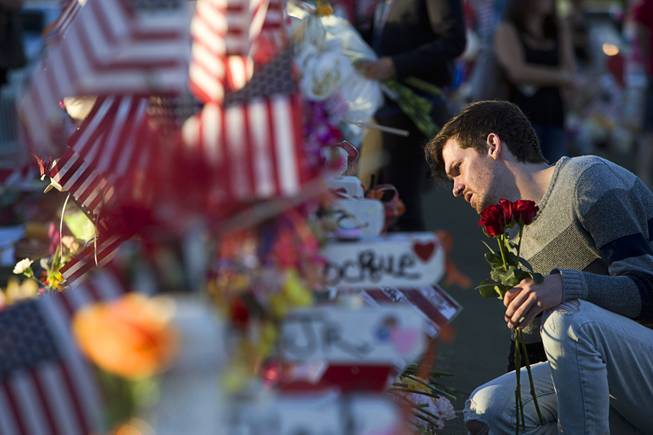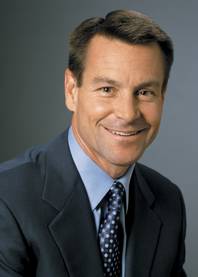
Taylor Perkins of Las Vegas looks over the wood cross for his friend Cameron Robinson, one of the 58 mass shooting victims, in the median of Las Vegas Boulevard South near the “Welcome to Las Vegas” sign Monday, Oct. 9, 2017.
Thursday, Dec. 14, 2017 | 2 a.m.
Related Coverage
The committee tasked with deciding who qualifies for a portion of the Las Vegas Victims Fund is expected to release the final distribution plan on Friday.
A draft of the plan was released last month. It laid out a protocol for giving money to families or estates of the 58 people who died in the shooting on the Las Vegas Strip on Oct. 1, as well as to any of the hundreds of survivors who spent at least one night in the hospital getting treated for physical injuries related to the shooting. Excluded from the draft plan are survivors who were injured – some quite severely and requiring ongoing medical attention – but who did not stay overnight.
The Las Vegas Victims Fund, currently about $16 million, is expected to rise through Jan, 31, when donations will no longer be accepted.
It includes money held in the titular GoFundMe account launched by Clark County Commission Chairman Steve Sisolak and Sheriff Joe Lombardo immediately after the shooting. It also includes money held in other accounts (such as the National Compassion Fund), as well as pledges made by companies such as UFC and Zappos. All of this money will be pooled and distributed by the Las Vegas Victims Fund, which established nonprofit status.
An online portal for submitting claims will launch soon, and the claim submission period will run until Jan. 31. This means victims and surviving family members could see funds in their bank accounts sometime in March.

Scott Nielson
Scott Nielson, a consultant and former chief development officer for Station Casinos, is chairman of Las Vegas Victims Fund committee. Nielson spoke with the Las Vegas Sun about the task of assigning financial value to the loss of life, physical injuries and emotional trauma. Edited excerpts follow:
The committee held two town hall meetings and have been accepting written comments about the draft distribution plan. What has the response been?
There are a number of different categories they fall into. There are a number of people injured who were not hospitalized: “I was injured, but I received outpatient treatment. You should include those people not hospitalized but affected.” Then, people who have suffered emotional trauma. ... People saw horrible things that they should never had to see. As a result of that, you have a lot of people who have significant emotional trauma. They’ve asked to be compensated as well.
Nobody envies the decisions the committee has to make. How have you all been processing hearing those heartbreaking stories and figuring out the distribution plan?
The dilemma is, if you try to compensate all those thousands and thousands of people. … They are real victims, but if you try to financially somehow share that gift, that doesn’t leave very much for the families of the people killed, or other survivors that were more physically injured.
The Las Vegas Victims Fund, about $16 million and rising, might seem like a lot, but a similar fund in Orlando, Fla., after the Pulse nightclub shooting had $29.5 million. One after the Boston Marathon bombing raised $61 million. Is that weighing heavily on committee members’ minds?
That has been a cruel reality. We won’t nearly have as much money to disperse as Boston or Orlando. Since the draft protocol was released and the town halls held, there has been renewed interest. We are seeing more money come in, which is a wonderful thing. But even if the money increases, we’re not going to get close to what they were able to distribute. Having a lot more potential claimants, that’s just going to mean that everyone is going to get less.
The way we’re looking at it, everything that has been given was from the kindness of people’s hearts to show they care. They were giving a gift. We’re not looking and trying to say, ‘One person had a lot more medical expenses, one person missed more work.’ We’re just trying to take this gift and give it out in a transparent fashion that is equitable.
Las Vegas Victims Fund committee members
Barbara Molasky, outreach director, Core Academy
Barry Lieberman, chief development officer, South Point
Bill Noonan, senior vice president of industry and government affairs, Boyd Gaming
Dana Lee, vice president, Familee Properties
Deacon Tom Roberts, president and CEO, Catholic Charities
Alison Netski, chair of Department of Psychiatry & Behavioral Health, UNLV
Dr. Ikram U. Khan
Elynne Greene, victim advocate manager, Metro Police
Hunter Campbell, executive vice president and chief legal officer, UFC
Jackson Wong, accounting manager, Metro Police
Kristin Tyler, partner at Garman, Turner, Gordon
Magann Jordan, victim/witness program administrator, Clark County District Attorney Office
Peter Guzman, president and CEO, Latin Chamber of Commerce
Punam Mathur, executive director, Elaine Wynn Foundation
Scott Nielson, president, Nielson Consulting, LLC
Yolanda King, Clark County Manager
Why do you think we raised so much less?
Part of it is we had floods in Texas and the South (prior to the shooting). Then, on the heels, we had fires in California. It is almost like it was one thing after another. I think people felt like they wanted to give to different things. I haven’t focused on the why the amount is what it is, but instead just keep asking for people to be generous.
Kenneth Feinberg, an expert on victim compensation, and the National Compassion Fund have both been advising the local committee. What advice have they given?
That it’s a difficult process. No matter what you do, some people are going to be disappointed. That’s a reality. What they’ve advised is to continue to focus on doing what we believe is the best for the most people, for those people most impacted. As long as you do that, the criticism can be what it is. That’s the best you can do.
Has being part of this process affected you? Has it changed the way you view the Las Vegas community?
I am very proud of the response (to the fund). I’m very appreciative of the work being put in – the contributions, the fundraising. I really can see the best in our community. On a personal level, it’s difficult to have to say ‘no’ to some people. When you see people are impacted yet from a financial standpoint you’re not going to be able to help everybody. … It points out that we (as a city) need to reach out to people who have been affected and help provide them with services, so they can get counseling if need be.
Has there been talk within the committee about that?
Those kinds of things are outside the purview of the committee, but it is starting to happen — those larger conversations about how we can help here in our community.
Las Vegas obviously learned a lot from mistakes and issues that arose in Boston, Orlando, Aurora, Colo., … What might future cities dealing with tragedy learn from us?
You do learn lessons. Obviously nobody (on the committee) has ever dealt with this before. … What we can lend to perhaps others in the future is having these charitable entities already formed, so we can reach more quickly. I think that other cities need to think about how to prepare for the worst.
Any parting thoughts?
I would make another pitch. If anybody is thinking about contributing, please do. We want to be able to help as many people as we can.
